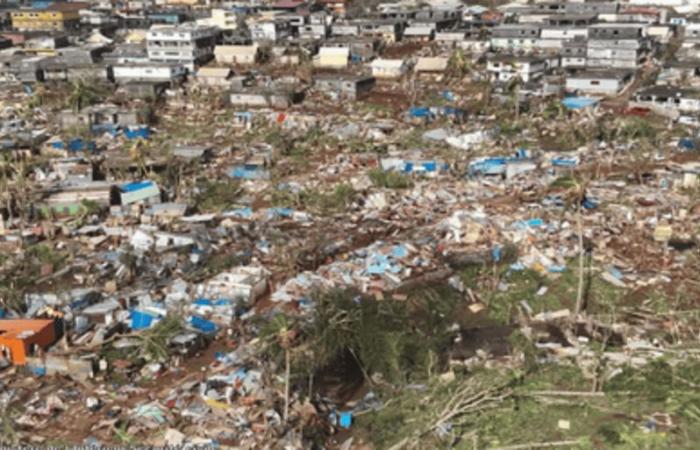While the government continues to communicate about an imminent reopening of schools on January 20, the situation reveals, beyond the destruction of educational establishments, the structural failures and colonial policies implemented in the island's education system.
An off-ground return to school due to the catastrophic management of Cyclone Chido
School buildings did not escape the power of Cyclone Chido, which hit some 200 schools, 22 middle schools and 11 high schools on the island hard. 40% of school infrastructure was impacted with the collapse of hundreds of entire classrooms, the destruction of roofs and even water and electricity connection networks. The educational establishments that stood still today serve as refuge and shelter in Mamoudzou for more than 4,000 people, including 1,223 children who lost everything and found themselves homeless, despite scandalous eviction operations. operated by the State in certain establishments which put hundreds of them back on the street. If certain establishments continue to welcome affected families, the citizens' collective 2018, known for its violent actions against foreigners, has already organized several operations to evict people considered to be foreigners from schools and throw them away. the street These shameful actions were legitimized by the forces of repression who took over by evicting people, without offering rehousing. The government's refusal to offer sustainable rehousing solutions is fueling the proliferation of these xenophobic actions, particularly in Kwalé.
Beyond the destruction of buildings, the chaotic situation which has persisted since the passage of the cyclone affects the vast majority of the 115,000 students on the island who are subject to the catastrophic and ultra-security management implemented by the State. With thousands of children relegated to slums who have lost their homes, largely insufficient humanitarian aid, a still glaring lack of access to water and electricity and movement largely hampered by the resumption of police controls, the scandalous conditions in which students are kept must be widely denounced.
It is in this disastrous context that the government is proposing a hypocritical response to the resumption of school on the island after the passage of cyclones Chido and Dikélédi. Administrative and teaching staff are supposed to resume from January 20 to 24 and welcome students from January 27, but “ no one is ready » according to the SNUipp-FSU union. This above-ground proposal attempts to minimize the scale of the climatic, humanitarian and social catastrophe at work on the island. For example, the post-Chido report from the town of Mamoudzou on school reconstruction indicates that many establishments will not be able to reopen before March and that an imminent reopening will therefore lead to thousands of precarious families on the street, without the possibility reconstruction of their homes, the prefect having made the purchase of the sheets conditional on proof of identity and address. Sheet metal whose prices have already exploded-].
9% of the population of Mayotte not in school: xenophobic and social discrimination
While approximately 115,000 children attend school on the island, nearly 9,575 children were already out of school before Cyclone Chido struck. For more than 15 years, numerous institutions, union sections and associations have been warning of the existence of systemic discriminatory practices in school registration in Mayotte (as well as in Guyana). The decree of June 29, 2020 supposed to facilitate school registration procedures is met with arbitrary refusals at the counters of the municipalities of Mayotte. For example, the recent report from the Court of Auditors on the commune of Kani Kéli indicates: “ The mayor uses his right of verification by carrying out investigations carried out by the municipal police. If this investigation reveals that the child does not reside at the address indicated, his or her registration is refused. The municipality applies more restrictive conditions than those provided for by the texts in force […]. These restrictive conditions of access to school prevent the schooling of the most precarious ».
In addition, Mayotte suffers from a severe lack of investment in school infrastructure and inadequate distribution according to geographical areas. While 8 out of 10 children live in extreme poverty, only 1 in 5 students now benefit from a hot meal at school. Other establishments offer a simple snack consisting of a piece of bread and cheese or corn and let students eat off the floor.
To compensate for the lack of school buildings, the rectorate has set up a system of itinerant classes which consists of welcoming students for reduced time slots in premises outside the school premises. On this point, numerous associations and institutions denounce the racist and xenophobic nature of this system, mainly composed of foreign children and deployed in a seriously degraded educational context. Justice (TA Mamoudzou, October 28, 2021) also recognized a “ serious violation of the principle of non-discrimination ».
Beyond the catastrophic conditions and the racist sorting carried out at the school gates, it is the entire educational institution which perpetuates the colonial system at work in all the territories colonized by France. The language of learning remains only French, which is not the mother tongue of more than 70% of children. This colonial persistence of learning French as the only language places, dramatically, most children in situations of permanent failure.
-Education staff on the front line of colonial management of the crisis
From their position, education workers must organize to denounce a two-tier school that sorts based on papers and attracts metropolitan teachers with bonuses to the detriment of the stability and well-being of students. Lack of teachers, massive recourse to precarious contracts, excessive use of bonuses to attract metropolitan teachers to the detriment of local teachers… Ambroise, teacher in Mayotte, testifies to the situation in Permanent Revolution : « there is no consideration of the colonial situation within the teaching unions nor of the role that civil servants play in this system, with their bonuses and advantages which maintain inequalities with the rest of the population ».
In addition, the movement of the population is governed by exceptional legal provisions facilitating identity checks, permitted only in Mayotte by the code of criminal procedure “throughout the entire territory”. This repressive exemption inherited from colonial law has left the field open for the development of generalized arrests by repressive forces, anywhere and at all times, establishing on the island a real daily policy of tracking down undocumented immigrants. Abdou, a professor, shared his surprise with us when he learned that residents were told “ to go to accommodation centers and that on Petite-Terre, the safest place to accommodate them is the CRA (editor's note: administrative detention center). It's incredible, if there is one place where an undocumented migrant will never go at the risk of his life, it's the CRA! ».
This is also the case for all educational establishments. Many teachers testify to the danger that the path to school represents for children, at the mercy of identity checks carried out by the PAF in front of establishments, as Abdou recounts: “ one late afternoon, I was surprised to see the PAF practically at the high school gate. The PAF at the gates of a school is not normal! “. These daily checks aim to massively detain thousands of children before their expulsion to the neighboring Comorian island of Anjouan in record time. This confinement is also facilitated by deliberate falsification of the age of minors controlled in order to be able to expel them alone without their parents.
The start of the school year and the “reconstruction” of education are therefore taking place against a backdrop of xenophobic policies to the detriment of students whose parents are illegal. The plan Mayotte standing has already announced the possibility of temporary schooling in France for children who can travel outside the island, in other words children of French nationality. This reactionary rhetoric which sorts students according to their papers serves an anti-migrant political agenda, like the proposal from MP Estelle Youssouffa who recommends suspending the education of foreign students and thus going ever further in the hunt for these young people: “ it seems urgent to us to suspend compulsory schooling for foreign students, to put an end to the territorialized visa, to initiate a massive operation to deport foreigners in an irregular situation to the border and to set a moratorium on the examination of applications for asylum, issuance and renewal of titles, residence cards and movement documents for foreigners in Mayotte “. Certain measures had already been proposed by former minister Guévenoux in May 2024 as part of the Mayotte bills, before the dissolution suspended parliamentary work.
Against this security and xenophobic management of the humanitarian disaster, many professionals in the education sector have played a progressive role by being on the front line in the immediate management of the post-Chido disaster. These professionals demonstrated the strength of self-organization from below, by traveling directly to the affected neighborhoods to identify living students, raise funds, organize citizen distributions to provide initial food aid and sanitary. The prospect of a return to school in such a context triggered a strike notice filed on January 9 by the SNES-FSU union. According to the general secretary, the organization of the start of the school year was designed “ without any directive, any protocol, in improvisation, we are asked to come together to build a plan for resuming school activities ».
Faced with this repressive management of the humanitarian disaster and a two-speed school, it is on the initiatives carried out by education personnel that we must rely in connection with the solidarity movement which is expressed by down without expecting anything from the colonial state which is pushing the island's inhabitants ever deeper into misery. Against these xenophobic, racist and deadly policies, workers in education and other sectors must demand the schooling of all without papers, an end to PAF checks in front of schools, a real assessment of the situation in each educational establishment and the requisition of empty buildings to accommodate the victims.






